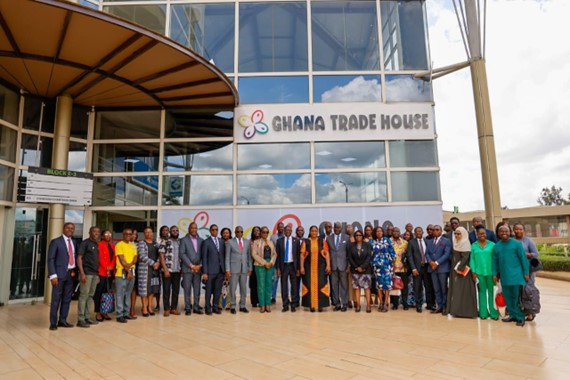…as GSA collaborates with KEBS for common trade standards under AfCFTA
As part of Ghana’s maiden market trade expedition to Kenya, several landmark events on the frontiers of promoting trading between Ghana and Kenya were held with the most significant one being the establishment and official opening of a new trade and business center in Kenya by the Ghana Export Promotion Authority (GEPA) called the ‘Ghana Trade House’ to facilitate the export of Ghanaian goods and services to the East African Nation and promote the implementation of the African Continental Free Trade Area (AfCFTA).
In addition to the official opening and launch of the ‘Ghana Trade House’, the Ghana Standards Authority (GSA) and the Kenya Bureau of Standards (KEBS) commenced engagement to facilitate a Memorandum of Understanding (MoU) between the two organizations to establish a framework for mutual recognition and acceptance of standards to ensure efficient trade and regulatory compliance between Ghana and Kenya. The MoU, when signed, represents a significant step towards strengthening trade ties and promoting economic cooperation between Ghana and Kenya in the realm of standards and quality assurance under the AfCFTA.
The National AfCFTA Coordination Office (NCO) also leveraged on the success market entry trade expedition to commence extensive engagements with enterprises who participated in the expedition in a bid to support and empower these Ghanaian companies in maximizing the benefits gained from their participation and to ensure their continued growth and success under the rules of the AfCFTA.
Speaking during the official launch of the Ghana Trade House which is a one-stop shop outlet, located in Nairobi’s Sameer Business Park, Dr. Afua Asabea Asare, the CEO of GEPA, said the facility is intended to provide a platform for Ghanaian exporters to showcase their products and services in the East African country, fostering economic growth and development which forms part of the implementation of Ghana’s National Export Development Strategy (NEDS) to generate US$25.3billion in Non-Traditional Export (NTE) revenues by the year 2029 also serving as an important indication of growing economic cooperation between Ghana and countries within the East Africa region.
“This initiative signifies a giant step toward regional integration within Africa. It puts actions behind our words and highlights the commitment to promoting intra-African trade and cooperation. Other countries on the continent can foster similar initiatives, creating a network of trade houses that facilitate trade and economic integration at the regional level.”
The GEPA CEO added that the Ghana Trade House will stock premium Ghanaian products for the East African market, create businesses and employment opportunities, serve as a hub for networking between Ghanaian and Kenyan business representatives and become an avenue for cultural exchange between Ghana and Eastern Africa.
“It’s a fact that by promoting African products and brands on a continental scale, we tend to showcase the diversity and quality of African goods and services, fostering a positive image of African products in international markets. This can lead to increased demand, market penetration, and improved competitiveness for African businesses, complemented by a robust trade infrastructure and supportive environment for trade promotion,” she asserted.
Madam Floice Alukabana, Ag. CEO of the Kenya Export Promotion and Branding Agency (KEPROBA), urged African nations to commit themselves to promoting trade liberalization through market linkages, adding that KEPROBA will continue to collaborate with GEPA to boost trade between Kenya and Ghana.
Nana Ama Dokuah Asiamah Adjei, the Deputy Minister for Trade and Industry of Ghana and Oliver Konje, Kenya’s Ag. Director for International Trade at the Ministry of Investment, Trade, and Industry urged the private sector and businesses in Ghana and Kenya to explore opportunities in markets of both countries by promoting export products that have comparative advantages.










